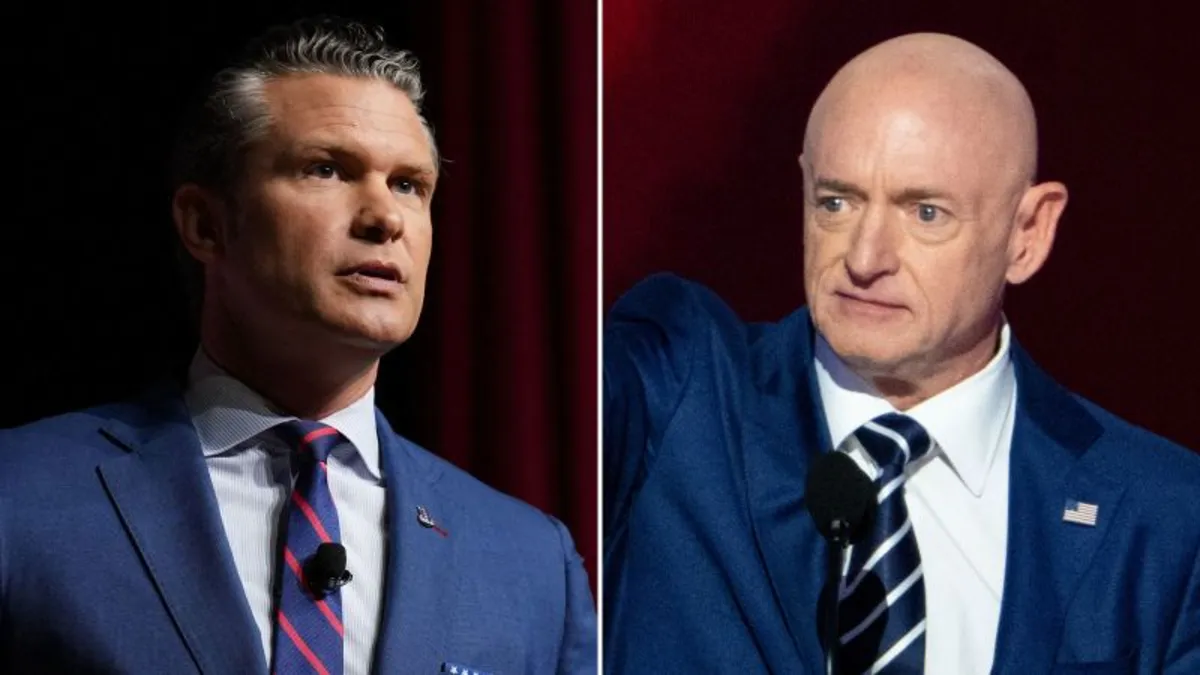
Secretary of Defense Pete Hegseth has publicly condemned six Democratic lawmakers who released a controversial video urging military service members to disobey illegal orders. Hegseth labeled the group as the “Seditious Six,” describing their message as “despicable, reckless, and false.” His criticism has particularly focused on Senator Mark Kelly, the member of the group with the longest military tenure and the highest rank of captain in the Navy. Unlike the other lawmakers, Hegseth has specifically targeted Kelly, mocking him for a photograph in uniform and asserting that Kelly's “conduct brings discredit upon the armed forces and will be addressed appropriately.”
Behind closed doors, Hegseth is reportedly considering various disciplinary actions against Kelly for his involvement in the video. These options could range from reducing the retired US Navy captain’s rank and pension to pursuing prosecution under military law. A source familiar with Hegseth’s deliberations indicated that he views Kelly as a significant critic and might consider using the military justice system to set an example. Unlike the other five Democrats involved in the video, Kelly is a military retiree, which means he is still subject to the Uniform Code of Military Justice (UCMJ), including its restrictions on free speech.
Legal experts have noted that Kelly could potentially be recalled to active service and court-martialed due to his military retiree status. However, such a move would be unprecedented, particularly because it raises serious separation-of-powers issues between the executive and legislative branches. Rachel E. VanLandingham, a national security law expert and former active-duty judge advocate, emphasized that Hegseth’s public statements about Kelly could be seen as “unlawful command influence.” This situation complicates the possibility of a fair hearing, as all personnel at the Defense Department are under Hegseth's command.
A coalition of former and retired military judge advocates has issued a joint statement expressing concern that the Pentagon's intentions to recall Kelly for UCMJ prosecution are politically motivated and lacking legal basis. They warned that Hegseth's influence could disqualify all convening authorities, except possibly the president, from proceeding with a court-martial. The statement reflects the serious implications of Hegseth's public comments and highlights the potential for bias in any military legal proceedings against Kelly.
The video, which has drawn sharp criticism from the Trump administration, stated that “threats to our Constitution” are emerging “from right here at home.” The lawmakers urged the military and intelligence community to “refuse illegal orders,” although they did not specify which orders may be deemed illegal. Concerns have been raised across both political parties regarding the legality of certain military actions, such as strikes against drug boats in the Caribbean and deployments to U.S. cities amid governors' protests.
As the controversy unfolds, Kelly’s involvement in the video is currently under “review” by the Pentagon, rather than being subjected to a formal investigation. This means military police are not yet involved, leaving the outcome uncertain. Hegseth has deferred to his Navy secretary for recommendations, with a deadline set for December 10. He has also suggested the possibility of administratively reducing Kelly’s rank, referring to him as a “retired Navy Commander,” which is lower than his actual rank of captain.
The legal landscape surrounding this issue is complex. The administration has cited a World War II-era federal law that prohibits actions disrupting military discipline and loyalty, although this law has rarely been invoked in modern times. Hegseth's assertions regarding Kelly's conduct appear to lack a cohesive legal theory, as the UCMJ provisions he references do not align clearly with a single charge. If Kelly were to be court-martialed, the case would be processed by officers in the Judge Advocate General corps, which has faced significant changes under Hegseth's leadership.
The potential prosecution of Kelly would mark a significant escalation in military legal actions against a sitting senator and retired military officer for statements protected under free speech. Legal analysts argue that such an attempt would face formidable First Amendment challenges, particularly given Kelly’s additional protections as a senator under the Constitution’s speech and debate clause. Despite the pressures from Hegseth’s office, Kelly has remained defiant, asserting that he will not be intimidated by those prioritizing power over constitutional principles.